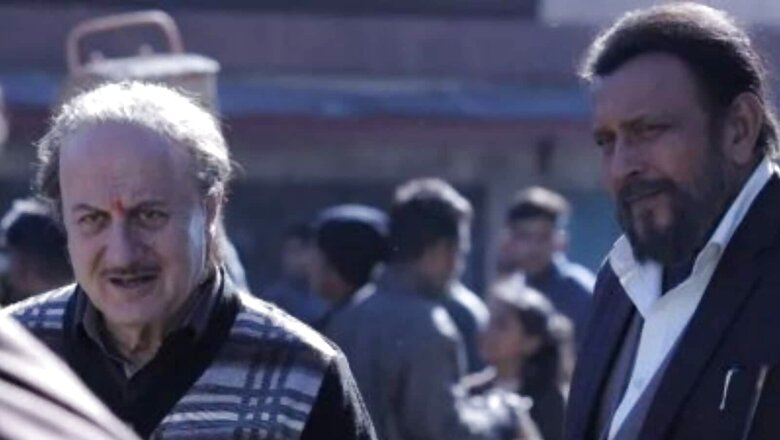
views
Kashmir has always been Bharat Mata’s crowning glory. Kalidasa’s ‘Meghadūta’ and ‘Kumārasambhava’ (4th-5th century AD), ‘Samanya Matrika’ (11th century AD), and ‘Rajatarangini’ (12th century AD) describe its rich Hindu legacy. These works of literature, as well as historical details of Kashmiri kings like King Lalitaditya of the Karkota dynasty, have been hidden to legitimise Islamist-separatist rhetoric.
The Kashmir Files surpassed Rs 100 crore at the box office in its first week and is now on its way to reaching the Rs 250-crore mark, defying inexorable bigotry and segregation in Bollywood’s rank and file. It began with 500 screens, frenzied blanketing, and outright cornering. It is now reportedly running on 4,000 screens and due to people’s movement. It shook the Islamists to a point where the filmmaker of this movie, Vivek Agnihotri, has been assigned Y-category protection.
In the aftermath of dastardly and barbaric events of the 1990 Kashmiri Hindu genocide, the film depicts other acts of brutality against non-Muslims in Kashmir. Apathy of Nehruvian-secularists is exemplified by their deafening silence during the course of the next three decades. And to keep the movie ‘tolerable’, The Kashmir Files only shows 5 per cent of the crimes. It gives me chills to think of the heroism of Kashmiri Hindus who had endured the pain without any support from so-called secular governmental machinery.
The Nehruvian-secularists and the Tukde-Tukde gang propelled and perpetuated the fiction that Kashmiri Hindus were weak, submissive and frail, which defies both comprehension and historical reality.
Because the lionhearted gatekeepers not only resisted the Islamic fanatics but also refrained from picking up arms in response, the Islamic conquest of India or ‘Ghazwa-e-Hind’ couldn’t happen.
ALSO READ | Rewinding History, Unwinding Apathy: Why They Don’t Want You To See The Kashmir Files
This brings to mind another country that suffered at the hands of the Islamic invasion model – Lebanon.
Lebanon is a 7 million-strong Gulf country. This little country in West Asia is flanked by the Mediterranean Sea on one side, Syria on the other, and Israel on the south. A number of indicators lead to an unsettling warning that what happened to Lebanon in the past may happen to Bharat in future.
The Early Days
Until 1956, Lebanon’s population was roughly 54 per cent Maronite Christians. Lebanon and Israel were the region’s only non-Muslim democracies. As a result of its geographic location, most West Asian refugees sought sanctuary in Lebanon for many years. Even during the Ottoman Empire, Lebanon did not become a Muslim country. Christians of all denominations came to Lebanon to escape the Ottoman Empire’s wrath.
The Lebanon Fiasco
During the Palestine exodus in the 1970s, Jordan and Iran refused to accept migrants. They had no choice but to seek shelter in Lebanon. This increased the Islamic population in the country. Soon after arriving, Palestinians began assuming democratic offices, aided by a terrorist group called the Palestine Liberation Organisation (PLO). Even though they were far from being ‘secular and leftist’, the Palestinians in Lebanon began to do all their politics under the guise of being ‘secular and leftist’. ‘Aggressive and rightist’ became a slur.
By 1975, Lebanon’s Muslim population had exploded, sparking a civil war. At the start of the Lebanese Civil War, 44 per cent of country’s population was Muslim. By the end of the war, Muslims made up 54 per cent of the population, while Christians made up 44 per cent. Illegal infiltration from neighbouring countries and killing of the native population were key factors.
Democracy to Terror Training Camp
Muslim mobs and militias targeted Christians. According to market researcher Statistics Lebanon, the current Muslim population in Lebanon is 57.7 per cent, whereas the Christian population is only 36.2 per cent. On January 20, 1976, left-wing PLO and as-Saiqa terrorists attacked a Maronite Christian town on the key route south of Beirut. After the civil war ended in 1990, Lebanon reached its democratic peak. Against this backdrop, it only took Hezbollah, Hamas, and the PLO 15 years to turn Lebanon from a democracy into a terror training camp.
ALSO READ | The Kashmir Files: When a Movie Shocks, Shakes and Awakens a Nation
What’s Similar to India and Lebanon
1. Lebanon accepted Palestinian refugees for humanitarian reasons. But, along with the Palestinians, Jordanians were also allowed without formalities. In a flash, the country’s demographic altered. In India, immigrants are entering illegally on a regular basis. Eight out of 28 Indian states are Hindu minority states, indicating a pattern.
2. When violence broke out in one city or region of Lebanon, the other region did not intervene or look closely enough. Even when crimes against Christians increased, no help came, and the brutality was allowed to continue. In India, the Kashmiri Hindu pogrom took years to become a national issue, and the Delhi riots are seen as a local matter. A pattern requires immediate planning and implementation.
3. For a long time, both Lebanese and Indians ignored the demographic question. The population control bill should no longer be delayed but enforced.
4. While Syria continued to fund, arm and inform terror groups like Hezbollah, illegal Jordanians continued to enter Lebanon, skewing Lebanon’s demography. China, Pakistan and Bangladesh have comparable roles.
If we look back at Kashmiri politics (or any leftist-liberal political movement in India), the same methodology leads to Islamisation of Hindus. The Hindu Dharma is the only religion and civilisation that has survived Islamic and Christian invasions. The assertiveness, lawfulness and sheer courage of Kashmiri Pandits in the face of ignorance of humanitarian organisations and lack of institutional support must be lauded.
I thank all Kashmiri Hindus for their unwavering resolve and pledge to contribute to a future where a Vivek Agnihotri doesn’t need to make ‘The India Files’.
Yuvraj Pokharna is a Surat-based educator, columnist, and social activist. The views expressed in this article are those of the author and do not represent the stand of this publication.
Read all the Latest Opinion News and Breaking News here














Comments
0 comment